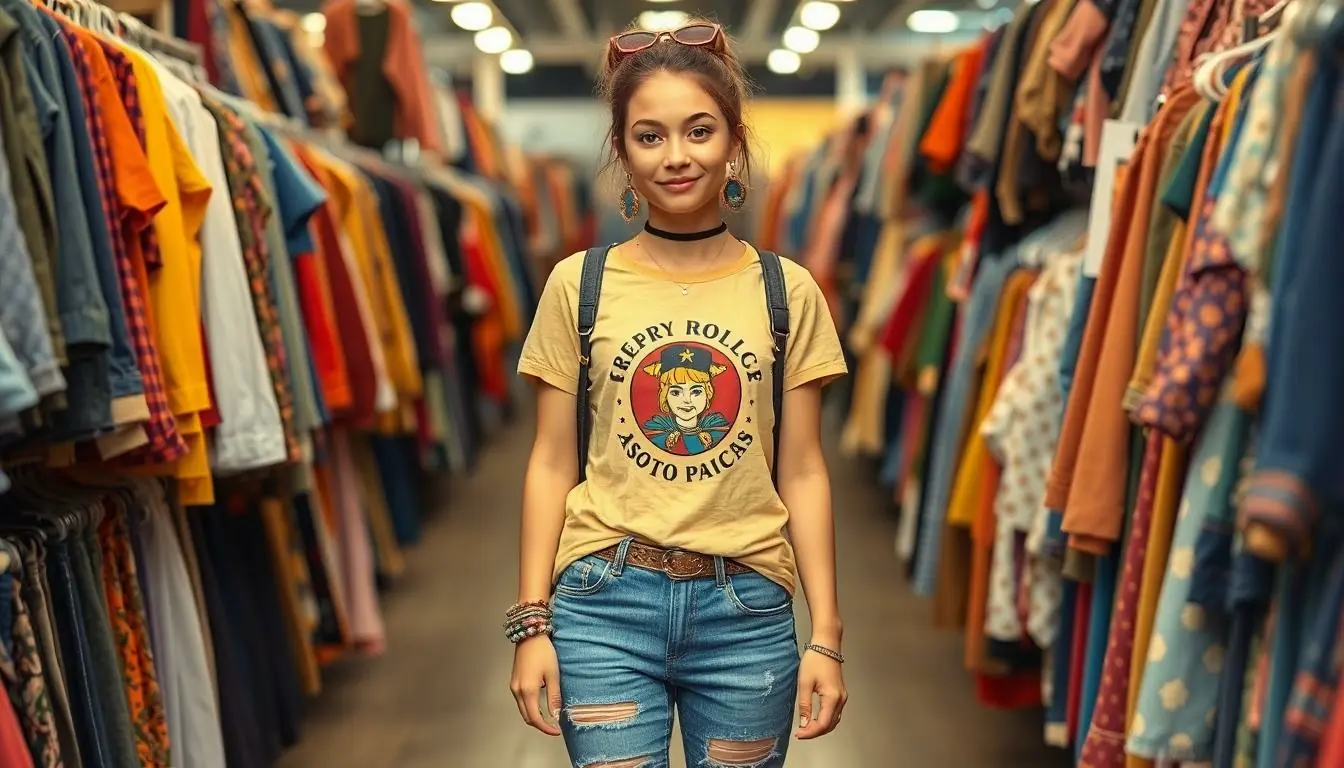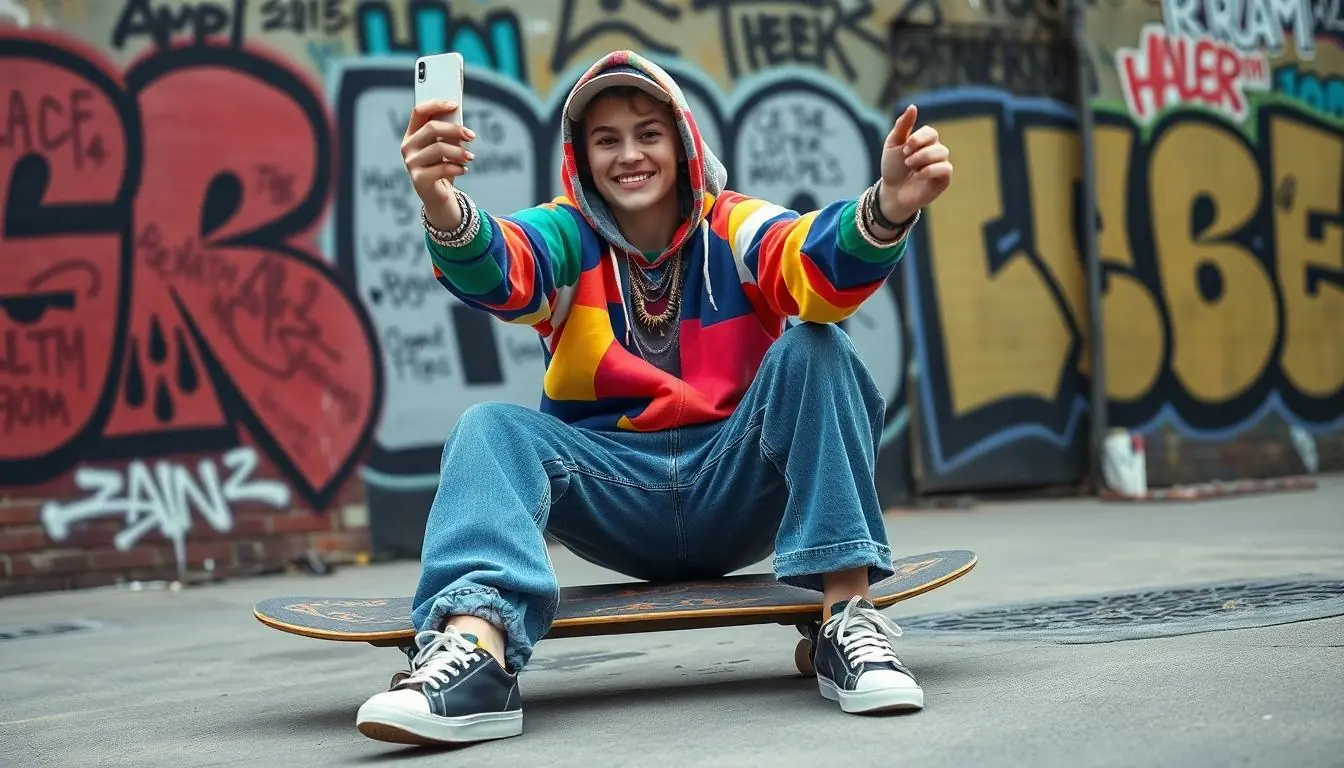Table of Contents
ToggleGen Z isn’t just changing the world; they’re flipping the fashion industry on its head. With a flair for creativity and a knack for mixing vintage with modern, this generation is setting trends that leave the rest of us scratching our heads—and maybe even raiding our parents’ closets. If you thought tie-dye was just a relic of the past, think again.
Overview of Gen Z Clothing Trends
Generation Z is reshaping fashion through their fresh and eclectic style. Vintage pieces mixed with modern aesthetics define their wardrobe choices. For instance, tie-dye shirts, which many considered outdated, are experiencing a strong resurgence. Graphic tees with bold statements are also popular, highlighting individuality and personal expression.
Sustainability plays a crucial role in Gen Z clothing trends. Many gravitate towards thrift shopping and upcycled clothing, favoring brands that prioritize environmental responsibility. This preference reflects a broader cultural shift toward ethical consumption.
Comfort remains a priority for Gen Z. Athleisure wear, blending style with practicality, dominates their daily attire. Baggy jeans and oversized hoodies provide both comfort and a retro flair, resonating well with their nostalgic influences.
Accessories enhance their outfits while showcasing unique personality traits. Chunky sneakers and layered jewelry are common choices. Statement bags, from mini backpacks to eco-friendly tote bags, complete their looks.
Social media influences these trends significantly. Platforms like Instagram and TikTok drive fashion inspiration, where trends can spread rapidly. Influencers often showcase DIY fashion hacks, enabling easy adaptation of popular styles.
Ultimately, Gen Z’s approach to clothing trends highlights creativity, individuality, and a commitment to sustainability. They blend past influences with modern tastes, resulting in a dynamic and expressive fashion landscape.
Key Characteristics of Gen Z Fashion

Generation Z prioritizes authenticity and innovation in their fashion choices. This demographic’s preferences reflect a strong commitment to sustainability and ethical practices, along with a desire for individuality.
Sustainability and Ethical Choices
Sustainable fashion holds immense significance for Gen Z. Many opt for thrift shopping to reduce waste and discover unique items. They often support brands that emphasize eco-friendly materials and ethical labor practices. Conscious consumption trends dominate their shopping habits, with a clear preference for brands that actively participate in sustainability initiatives. Upcycled clothing and vintage pieces consistently find their way into their wardrobes, showcasing a blend of creativity and environmental responsibility.
Emphasis on Individuality
Individuality thrives within Gen Z’s fashion landscape. Each person’s style often ranges from bold graphic tees to layered accessories that reflect personal taste. Unique outfits allow for self-expression, with many rejecting mainstream trends in favor of personal flair. Vintage and eclectic styles attract attention, offering a canvas for creativity. Social media serves as a platform for sharing their distinct looks, making personalization a crucial component of their identity in fashion choices.
Popular Styles Among Gen Z
Gen Z’s fashion choices exemplify a vibrant mix of influences. They embrace styles that prioritize comfort, originality, and sustainability.
Streetwear Influence
Streetwear heavily impacts Gen Z’s wardrobe. This urban-inspired aesthetic combines casual pieces with bold graphics. Brands like Supreme and Off-White define the genre, emphasizing oversized silhouettes and unique designs. Sneakers often feature prominently in their ensembles, with chunky sneakers leading the trend. Accessories such as bucket hats and fanny packs enhance the streetwear look, showcasing versatility and functionality. Social media amplifies this influence, enabling swift adoption of new trends and collaborations.
Vintage and Thrifted Finds
Vintage clothing plays a key role in Gen Z’s style spectrum. Thrifted items present opportunities for unique self-expression, making it easy to stand out from the crowd. Stores like Goodwill and online platforms such as Depop offer affordable options for curated vintage finds. Popular items include high-waisted jeans, graphic tees, and retro dresses that pair well with modern pieces. Sustainability underpins this trend, as many Gen Z shoppers prioritize ethical fashion. Overall, hunting for vintage treasures fuels creativity and reduces environmental impact.
Influential Brands and Designers
Generation Z’s fashion landscape thrives on innovation and authenticity, driven by both new and established brands that echo their values.
Emerging Sustainable Brands
Sustainable brands attract Gen Z’s attention by emphasizing eco-friendly practices and ethical labor. Examples include Reformation and Everlane, both of which prioritize transparency in sourcing and production. Many consumers actively seek options that align with their commitment to the environment. This demand results in a surge of brands like Girlfriend Collective, which utilizes recycled materials. Emerging labels like Pangaia also offer stylish and sustainable choices, appealing to environmentally conscious shoppers. Fashion-forward and sustainable, these brands resonate deeply with the values of Gen Z.
Mainstream Brands Adapting to Trends
Mainstream brands respond to Gen Z’s preferences by incorporating sustainability and vintage vibes into their collections. Companies like Nike and Adidas introduce eco-friendly lines that showcase recycled materials, appealing to the generation’s environmental priorities. Fast fashion retailers such as H&M and Zara are launching sustainable initiatives, including recycling programs and organic cotton clothing. Additionally, they adapt to the vintage aesthetic by offering items reminiscent of past decades. By blending modern trends with sustainability, these brands capture Gen Z’s unique style while addressing their ethical concerns.
Social Media’s Role in Shaping Trends
Social media platforms significantly influence Generation Z’s fashion choices. Instagram serves as a visual inspiration hub, showcasing unique styles from influencers and peers alike. TikTok trends often emerge rapidly, with viral challenges driving interest in certain clothing items and aesthetics. Gen Z interacts with content that resonates with their individuality, often opting for pieces that reflect personal style over mainstream popularity.
Authenticity matters greatly to this generation. They value genuine connections with brands, seeking transparency in materials and manufacturing practices. Influencers who promote affordable, sustainable options tend to attract larger followings, highlighting a shift towards ethical fashion. Users share DIY hacks on social media, inspiring others to repurpose clothing or try new styles without extensive spending.
Streetwear remains a popular trend reinforced by social media. Bold graphics, oversized silhouettes, and urban aesthetics dominate feeds, encouraging followers to embrace casual yet fashionable looks. Stores like Supreme and Off-White benefit from social media exposure, reaching a wider audience and deepening their influence.
Exploring vintage fashion, Gen Z actively engages in thrift shopping, often documenting their finds online. Platforms such as Depop provide a marketplace for unique, curated pieces that reflect their preference for originality. Thrifted clothing not only supports sustainable practices but also allows for creativity in personal expression. Followers often share how they style these vintage items, further enhancing the trend’s popularity.
Emerging brands increasingly harness social media, shaping trends that align with Gen Z’s values. Companies like Reformation and Everlane emphasize sustainability, using campaigns that resonate with eco-conscious shoppers. The mix of modern and vintage aesthetics through social media solidifies Gen Z’s role in transforming the fashion landscape, creating a cycle of inspiration and innovation within their community.
Generation Z’s influence on the fashion industry is undeniable. Their unique blend of vintage and modern styles showcases a commitment to individuality and sustainability. As they prioritize comfort and authenticity in their clothing choices, the fashion landscape continues to evolve.
Social media amplifies their voices and encourages creativity, making it easier for trends to emerge and spread. With a focus on ethical practices and eco-friendly materials, Gen Z is not just shaping fashion but also promoting a more sustainable future.
As they embrace thrift shopping and support innovative brands, the essence of their style reflects a deeper understanding of personal expression and environmental responsibility. This generation is not just following trends; they’re redefining them for a more conscious world.







